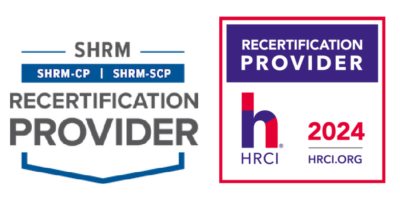 Obtaining a Board Certified Coach (BCC) credential through the Center for Credentialing and Education (CCE) is highly beneficial for HR professionals, as it validates their expertise, enhances their influence within their organization, and opens new opportunities for professional growth. AND my training is HRCI and SHRM approved so here’s why it’s a worthwhile pursuit:
Obtaining a Board Certified Coach (BCC) credential through the Center for Credentialing and Education (CCE) is highly beneficial for HR professionals, as it validates their expertise, enhances their influence within their organization, and opens new opportunities for professional growth. AND my training is HRCI and SHRM approved so here’s why it’s a worthwhile pursuit:
-
Establishes Professional Credibility
- The BCC credential is recognized as a rigorous and credible coaching qualification. See details HERE.
- It signals to employees, peers, and executives that the HR professional is trained and certified to apply evidence-based coaching techniques.
- Demonstrates a commitment to excellence and ethical coaching practices, enhancing trust in HR initiatives.
-
Enhances Leadership Development Programs
- Coaching is a cornerstone of effective leadership development. With a BCC credential, HR professionals can:
- Design and deliver in-house leadership coaching programs.
- Support managers in improving communication, decision-making, and team-building skills.
- It enables HR to lead by example, modeling coaching behaviors that inspire transformational leadership.
-
Improves Employee Engagement and Retention
- Certified coaching skills help HR professionals address employees’ career aspirations and personal challenges.
- Coaching enhances job satisfaction by empowering employees to find meaning and purpose in their roles.
- Proactively supporting employees with coaching can reduce turnover and boost workplace morale.
-
Builds Expertise in Navigating Workplace Challenges
- A BCC credential equips HR professionals to:
- Mediate conflicts with greater objectivity and sensitivity.
- Coach employees through career transitions or performance challenges.
- Foster resilience and adaptability during periods of organizational change.
-
Demonstrates Mastery of a Structured Coaching Process
- The BCC framework provides a structured approach to coaching that integrates proven methodologies, such as goal setting, active listening, and motivational interviewing.
- This structure enhances HR’s ability to deliver consistent and measurable coaching outcomes.
-
Strengthens Diversity, Equity, and Inclusion (DEI) Initiatives
- BCC-certified HR professionals are better prepared to:
- Coach employees across diverse cultural, social, and generational backgrounds.
- Address unconscious biases and promote inclusion through tailored coaching strategies.
- A coaching credential can expand an HR professional’s career trajectory by qualifying them for roles in:
- Talent development and organizational effectiveness.
- Corporate training and professional coaching.
- It also provides opportunities to offer external coaching services or consulting.
-
Meets Industry Trends and Expectations
- Organizations increasingly value coaching as an essential tool for employee development.
- Having a BCC credential positions HR professionals as thought leaders who align with contemporary workplace trends.
-
Contributes to HR’s Strategic Role
- The BCC credential enables HR to move beyond administrative functions and take a more strategic role by aligning coaching initiatives with organizational goals.
- HR professionals with coaching expertise can shape company culture, drive innovation, and improve overall performance.
-
Access to a Professional Network
- Becoming a BCC opens doors to a community of certified coaches, offering:
- Opportunities for continued learning and professional development.
- Collaboration and knowledge-sharing with peers across industries.
Summary
A BCC credential equips HR professionals with advanced coaching skills to support individuals and teams, contribute to organizational success, and grow their professional influence. This investment in certification not only enhances HR’s capabilities but also reinforces their role as a trusted and strategic partner in the workplace.
Want to learn about coach training that leads to the BCC credential? See below.






